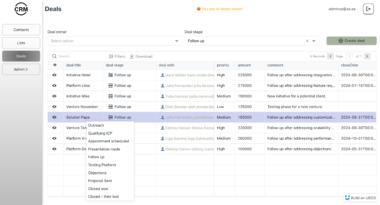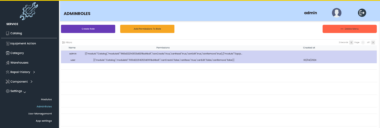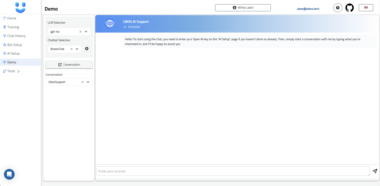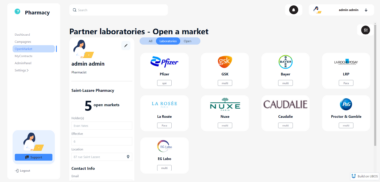Canvas LMS Model Context Protocol
A server implementation that enables Smithery to list tools without authentication, while deferring authentication until tool execution.
Lazy Loading Authentication
This server follows the Smithery recommendation for “lazy loading” of authentication:
Tool Listing: The
/api/toolsendpoint allows any client (including Smithery) to list available tools without requiring authentication. This is essential for discovery.Tool Execution: Authentication credentials are only required when actually executing a tool. The credentials are passed in the request body at execution time.
This approach ensures that:
- Smithery can display the tool list without requiring users to provide authentication upfront
- Security is maintained by requiring proper authentication when accessing protected resources
- API keys and sensitive credentials are only used when absolutely necessary
API Endpoints
Public Endpoints (No Authentication Required)
GET /api/tools- List all available toolsGET /api/tools/:id- Get details for a specific tool
Protected Endpoints (Authentication Required in Request)
POST /api/tools/:id/execute- Execute a specific tool
Request Format for Tool Execution
{
"parameters": {
"key1": "value1",
"key2": "value2"
},
"authentication": {
"apiKey": "your-canvas-api-key",
"domain": "your-canvas-domain.instructure.com"
}
}
Response Format
Success Response
{
"success": true,
"result": {
// Tool-specific result data
}
}
Error Response
{
"success": false,
"error": "Error message describing what went wrong"
}
Available Tools
Get Courses
- ID:
get-courses - Description: Retrieves courses from Canvas LMS
- Parameters:
limit(optional): Maximum number of courses to return
- ID:
Get Assignments
- ID:
get-assignments - Description: Retrieves assignments for a specific course
- Parameters:
courseId(required): ID of the course
- ID:
Development
- Install dependencies:
npm install - Build the project:
npm run build - Start the server:
npm start
Docker
A Docker configuration is included for easy deployment:
docker build -t canvas-mcp .
docker run -p 3000:3000 canvas-mcp
Canvas LMS MCP Server
This server acts as a backend proxy and utility layer for interacting with Canvas LMS instances, providing processed data intended for consumption by Language Models (LLMs) or other applications.
It allows fetching course details, assignment information (including descriptions and attached file links/content), discussion topics, and extracting text from PDF files hosted on Canvas.
Setup
Clone the repository (if applicable):
git clone <repository-url> cd CanvasMCPInstall Dependencies:
npm installConfigure Environment Variables: Create a
.envfile in the project root and add the following variables. Replace the placeholder values with your actual Canvas credentials.# Standard Canvas Instance CANVAS_API_URL=https://your-canvas-domain.instructure.com CANVAS_API_TOKEN=your_standard_canvas_api_token # AWS Hosted Canvas Instance (if applicable) AWS_CANVAS_API_URL=https://your-aws-canvas-domain.instructure.com AWS_CANVAS_API_TOKEN=your_aws_canvas_api_token # Server Port (Optional, defaults to 3000) PORT=3000Run the Server:
- For development (with auto-reloading):
npm run dev - For production:
npm start
- For development (with auto-reloading):
The server will be running at http://localhost:PORT (e.g., http://localhost:3000).
API Endpoints
All endpoints require the corresponding Canvas API URL and Token to be configured in the .env file.
Health Check
- GET /
- Description: Checks if the server is running.
- Example:
curl http://localhost:3000/ - Success Response:
Canvas MCP Server is running!(Content-Type: text/html)
Standard Canvas API (/api/...)
Uses CANVAS_API_URL and CANVAS_API_TOKEN.
GET /api/courses/:courseId
- Description: Get details for a specific course.
- Path Parameters:
:courseId(number): The ID of the course.
- Example:
curl http://localhost:3000/api/courses/12345 - Success Response (Example):
{ "id": 12345, "name": "Introduction to Programming", ... }
GET /api/courses/:courseId/assignments
- Description: Get a list of assignments for a specific course.
- Path Parameters:
:courseId(number): The ID of the course.
- Example:
curl http://localhost:3000/api/courses/12345/assignments - Success Response (Example):
[ { "id": 987, "name": "Assignment 1", ... }, ... ]
GET /api/assignments/:courseId/:assignmentId
- Description: Get details for a specific assignment.
- Path Parameters:
:courseId(number): The ID of the course.:assignmentId(number): The ID of the assignment.
- Example:
curl http://localhost:3000/api/assignments/12345/987 - Success Response (Example):
{ "id": 987, "name": "Assignment 1", "description": "...", ... }
GET /api/assignments/:courseId/:assignmentId/submissions
- Description: Get submission details for a specific assignment (requires appropriate permissions).
- Path Parameters:
:courseId(number): The ID of the course.:assignmentId(number): The ID of the assignment.
- Example:
curl http://localhost:3000/api/assignments/12345/987/submissions - Success Response (Example):
[ { "user_id": 101, "grade": "A", ... }, ... ]
GET /api/assignments/:courseId/:assignmentId/description
- Description: Get the assignment description along with extracted links to attached files.
- Path Parameters:
:courseId(number): The ID of the course.:assignmentId(number): The ID of the assignment.
- Example:
curl http://localhost:3000/api/assignments/12345/987/description - Success Response (Example):
{ "description": "<p>Please read the attached file.</p><p><a class="instructure_file_link" href="/courses/12345/files/44827106/download?download_frd=1" data-api-endpoint="https://rmit.instructure.com/api/v1/courses/12345/files/44827106" data-api-returntype="File">Instructions.pdf</a></p>", "linked_files": [ { "link_text": "Instructions.pdf", "file_id": "44827106", "download_url": "https://your-canvas-domain.instructure.com/files/44827106/download?download_frd=1" } ] }
GET /api/discussions/:courseId/:discussionTopicId
- Description: Get details for a specific discussion topic.
- Path Parameters:
:courseId(number): The ID of the course.:discussionTopicId(number): The ID of the discussion topic.
- Example:
curl http://localhost:3000/api/discussions/12345/678 - Success Response (Example):
{ "id": 678, "title": "Week 1 Discussion", "message": "...", ... }
PDF Tools (/api/pdf/...)
Uses CANVAS_API_URL and CANVAS_API_TOKEN.
- POST /api/pdf/extract-text
- Description: Downloads a PDF file from Canvas using its file ID and extracts the text content.
- Request Body:
application/json{ "fileId": 44827106 } - Example:
curl -X POST http://localhost:3000/api/pdf/extract-text -H 'Content-Type: application/json' -d '{"fileId": 44827106}' - Success Response (Example):
{ "text": "This is the extracted text content from the PDF...nPage 2 content..." } - Error Responses:
400 Bad Request: Missing or invalidfileId.401 Unauthorized / 404 Not Found: Invalid API token, insufficient permissions, or file ID not found (check server logs for details from Canvas API).500 Internal Server Error: Server configuration error (missing .env variables), failed to download, or failed to parse PDF.
Grades
Grade information for individual assignments is retrieved via the Submissions endpoint:
- GET /api/assignments/:courseId/:assignmentId/submissions
- Description: Get submission details for a specific assignment, including grades (
grade,score) for each submission. - (See full description under Standard Canvas API)
- Description: Get submission details for a specific assignment, including grades (
AWS Canvas API (/api/aws/...)
Uses AWS_CANVAS_API_URL and AWS_CANVAS_API_TOKEN.
These endpoints mirror the standard Canvas API endpoints but target the AWS-hosted instance defined in the .env file.
GET /api/aws/courses/:courseId
GET /api/aws/courses/:courseId/assignments
GET /api/aws/assignments/:courseId/:assignmentId
GET /api/aws/assignments/:courseId/:assignmentId/description
- (Note: The file download links returned here will point to the AWS Canvas instance)
GET /api/aws/assignments/:courseId/:assignmentId/submissions (Provides AWS grades)
(Usage and responses are analogous to the standard API endpoints above, but using the /api/aws prefix and the AWS Canvas credentials.)
Error Handling
The server includes a global error handler. Most errors originating from the Canvas API or internal processing will return a JSON response with an error object containing a message field:
{
"error": {
"message": "Specific error details here..."
}
}
Check the server console logs for more detailed stack traces and debugging information.
Canvas LMS Server
Project Details
- PewterZz/CanvasLMS-ModelContextProtocol
- Last Updated: 4/30/2025
Recomended MCP Servers
Press the . key on any repo

mcp soduku solver

This is an MCP (Model Context Protocol) server that connects your Limitless Pendant data to AI tools like...

description: "An MCP server that enables LLMs to 'see' what's happening in browser-based games and applications through vectorized...



A Model Context Protocol (MCP) server that bridges Video & Audio content with Large Language Models using yt-dlp.
alphavantage mcp server
 From vibe coding to vibe deployment. UBOS MCP turns ideas into infra with one message.
From vibe coding to vibe deployment. UBOS MCP turns ideas into infra with one message.





